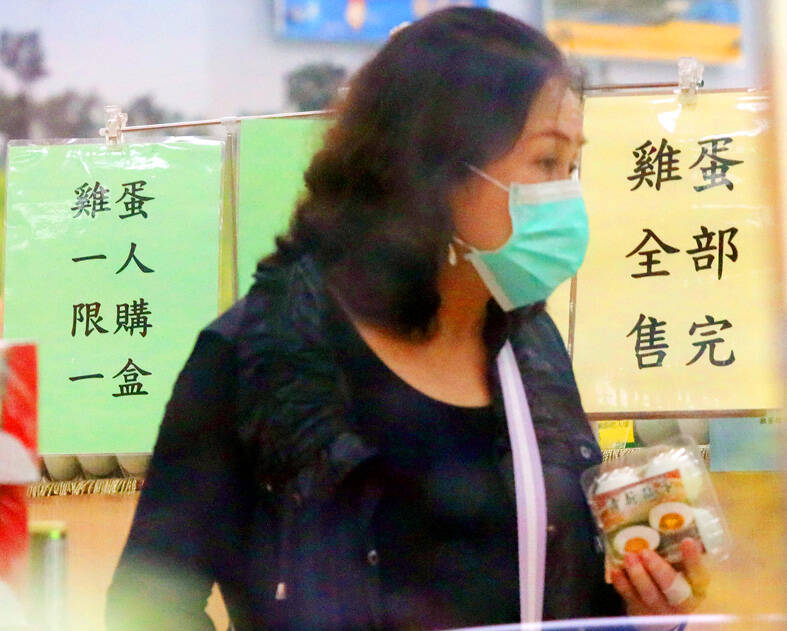A group of wholesale egg suppliers in Taipei is threatening to halt sales “indefinitely” if the Poultry Association extends a pricing freeze this week amid a domestic egg shortage.
The Poultry Association’s production and marketing supervision committee on Saturday froze the wholesale price of domestically produced eggs, which the group said was unsustainable and would harm egg farmers and suppliers.
The wholesale price of eggs in Taiwan is NT$55 per jin (600g), while the farm gate price is NT$45.5 per jin, the highest in several years, amid an egg shortage caused by avian flu epidemics, increased feed costs and a high number of molting hens, government officials said.

Photo: CNA
One of the Poultry Association committee members said the decision to freeze wholesale prices was partly because Taiwan was importing eggs to alleviate the shortage.
The nation has already taken delivery of part of a shipment of 5 million eggs from Australia and has ordered 2 million from Turkey, which would start arriving next month, Taiwan Egg Marketing Cooperative head Wu Tien-fu (吳天福) said.
When the committee meets this week, it would consider wholesale price adjustments based on whether imported supplies are sufficient to meet market demand, he said.
Lin Tien-lai (林天來), who heads the Taipei commercial egg association, said that he would seek a meeting with officials at the Council of Agriculture (COA), and if wholesale prices remain frozen this week, the egg market might be “closed indefinitely.”
Department of Animal Industry Deputy Director Chiang Wen-chuan (江文全) on Sunday said that the government agency has not been involved in the pricing decisions, or the negotiations between producers and sellers, and was not part of Saturday’s committee meeting.
The COA fully respects the market mechanism, but if the egg price review committee does not set a price, it would be left up to buyers and sellers to negotiate prices, Chiang said.
However, if businesses contravene the market mechanism, government agencies would investigate and address any problems, he added.
Regarding the threat to close the egg market indefinitely, Chiang said there is no unified wholesale market for eggs, so there is no “market closure” mechanism.
Some wholesalers have been offering farmers a price increase of NT$3 per jin in a bid to secure supplies, Wu said, adding that it had been an independent decision by the wholesale buyers and the COA was not involved.
The current daily domestic output of chicken eggs is 22.2 million (111,000 boxes), 200,000 fewer than the 22.4 million over the past few weeks when output was already 500,000 to 800,000 lower than usual, COA data showed.

The brilliant blue waters, thick foliage and bucolic atmosphere on this seemingly idyllic archipelago deep in the Pacific Ocean belie the key role it now plays in a titanic geopolitical struggle. Palau is again on the front line as China, and the US and its allies prepare their forces in an intensifying contest for control over the Asia-Pacific region. The democratic nation of just 17,000 people hosts US-controlled airstrips and soon-to-be-completed radar installations that the US military describes as “critical” to monitoring vast swathes of water and airspace. It is also a key piece of the second island chain, a string of

A magnitude 5.9 earthquake that struck about 33km off the coast of Hualien City was the "main shock" in a series of quakes in the area, with aftershocks expected over the next three days, the Central Weather Administration (CWA) said yesterday. Prior to the magnitude 5.9 quake shaking most of Taiwan at 6:53pm yesterday, six other earthquakes stronger than a magnitude of 4, starting with a magnitude 5.5 quake at 6:09pm, occurred in the area. CWA Seismological Center Director Wu Chien-fu (吳健富) confirmed that the quakes were all part of the same series and that the magnitude 5.5 temblor was

Taiwan will now have four additional national holidays after the Legislative Yuan passed an amendment today, which also made Labor Day a national holiday for all sectors. The Chinese Nationalist Party (KMT) and Taiwan People’s Party (TPP) used their majority in the Legislative Yuan to pass the amendment to the Act on Implementing Memorial Days and State Holidays (紀念日及節日實施辦法), which the parties jointly proposed, in its third and final reading today. The legislature passed the bill to amend the act, which is currently enforced administratively, raising it to the legal level. The new legislation recognizes Confucius’ birthday on Sept. 28, the

The Central Weather Administration has issued a heat alert for southeastern Taiwan, warning of temperatures as high as 36°C today, while alerting some coastal areas of strong winds later in the day. Kaohsiung’s Neimen District (內門) and Pingtung County’s Neipu Township (內埔) are under an orange heat alert, which warns of temperatures as high as 36°C for three consecutive days, the CWA said, citing southwest winds. The heat would also extend to Tainan’s Nansi (楠西) and Yujing (玉井) districts, as well as Pingtung’s Gaoshu (高樹), Yanpu (鹽埔) and Majia (瑪家) townships, it said, forecasting highs of up to 36°C in those areas